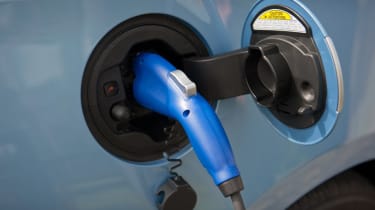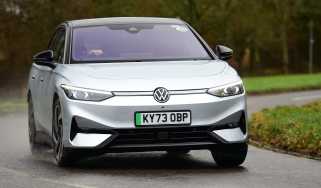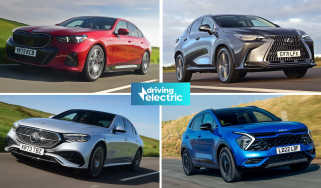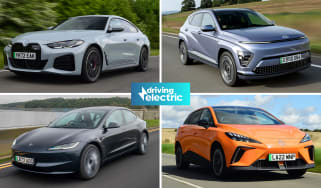Electric cars for business: tax, leasing, costs and charging explained
There are a whole host of benefits and some costs associated with a business switching to electric vehicles; here, we go through them all

Any company considering introducing electric vehicles to its fleet will be weighing up many issues, ranging from corporate social responsibility to customer and employee relations and the practical implications of making the switch. Many companies, of course, will be looking hardest at the bottom line.
Given the relatively high purchase or lease cost of electric cars and vans relative to their fossil-fuelled alternatives, on top of the practical and infrastructure challenges, in normal times the financial barriers to adoption might appear insurmountable. That’s why the government has implemented a range of measures to accelerate adoption of clean and green electric-vehicle technology by businesses large and small.
The benefits of running an electric fleet are not limited to clean air, great PR and tax benefits, though. Companies making the switch can also look forward to substantially reduced fuel bills, although this dividend may be initially offset by the cost of installing charging facilities. The initial purchase cost can be significantly higher, too, but you may save on maintenance and service costs. In other words, it’s as vital as ever to look at the total cost of ownership (TCO) rather than any single cost or saving.
Of course, businesses also have to consider the logistical implications of a switch to electric vehicles, which are clearly not yet suitable for all commercial roles due to limitations of range or capacity. When considering the switch, it’s also a great idea to look at the advantages of leasing as opposed to buying outright – lease deals often proving more advantageous for EV users.

Tax benefits of switching to an EV fleet
Tax incentives, most recently in the form of Capital Allowance from April 2021 through to 2024/25, but also in the shape of Benefit-in-Kind and National Insurance discounts on zero-emissions vehicles, have turned a challenge into an opportunity to save cash. Here’s a brief rundown of some of the benefits businesses and their employees can accrue by embracing the switch to EVs.
-
Capital allowances
This is a big one for business, as HMRC has decreed companies can write down 100% of the cost of an EV in the first year. Whether you’re a big fleet user or a small business running one or two vehicles, that’s going to look very positive on the annual tax return. It’s obviously relevant if you buy your own company vehicles, but also makes a big difference to leasing tariffs, thanks to the significant reduction in whole-life costs being reflected in monthly lease rates for electric vehicles. Compare that to the annual write-down rates of 18% for low-emissions cars (1-50g/km CO2) and 6% for everything else (50g/km and above) and financial directors will no doubt be keen to see their fleet managers 'follow the money'.
-
Benefit-in-Kind and National Insurance Contributions
Companies currently pay substantial National Insurance Contributions (NIC) based on the Benefit-in-Kind (BiK) received by employees using company-supplied vehicles for personal mileage. This runs into many thousands of pounds for senior employees.
For example, the annual Benefit-in-Kind tax payable for a standard executive model such as a BMW 520i petrol with a circa-£42,000 P11D price and 145g/km CO2 emissions would be over £5,500 for a 40% taxpayer. Thanks to a 1% BiK rate for EVs announced by the Treasury for 2021/22, rising to 2% in 2022/23, a driver who swaps that 5 Series for a Tesla Model 3 with a P11D price of £43,500 would face an annual BiK charge of just £175 in the first year.
That’s the equivalent of an impressive salary hike for the employee, while the company’s 1A NIC liability would fall commensurately – from around £6,000 for the BMW to around £180 for the Tesla over a three-year period. Multiply that over even a relatively small fleet of vehicles and the NIC benefit for companies quickly becomes significant.
It’s hard to see this as anything but a hugely generous ‘win-win’ for both employee and employer, courtesy of government policy to encourage electric vehicle take-up via the HMRC. The switch to electric should be easy to sell to company drivers, while the company bottom line gets a substantial boost, too. Of course, these incentives can only be temporary, and tax rates for electric cars seem certain to rise as they become a more established part of the company-car pool in the medium to long term. That’s why getting on board the electric bandwagon sooner rather than later makes sense.
-
Reduced benefits for plug-in hybrids (PHEVs)
The current HMRC BiK rates up to 2025 have been set to provide the greatest financial incentives for the cleanest cars – in terms of the CO2 emissions, at least. That means plug-in hybrid (PHEV) drivers can still deliver sizeable wins, but the rewards diminish with rising CO2 emissions.
For the next few years, any car delivering 130+ miles of electric range and emitting less than 50g/km CO2 attracts the 1% first-year BiK rate. However, PHEVs have a rating of between 7 and 13% depending on how far they can go on electric power alone according to official testing. You’ll need to consult the spec sheets and BiK rates carefully when specifying potential fleet acquisitions.
-
Fuel benefit and the Workplace Charging Scheme
Electricity is not classed as a fuel in tax law, however with the rise in numbers of employees charging their cars at home for business miles, HMRC has introduced an Advisory Fuel Rate for electric cars, which was set in 2018 at 4p per mile. Any amount paid over that is considered a Benefit-in-Kind and will be taxable unless companies/employees can prove higher cost.
There’s no BiK liable when companies provide workplace recharging for company cars or employees’ own cars, as long as the charging facilities are available to all employees – not just the MD, or a favoured few, for example. There’s no BiK either if companies choose to install charging points at employees' homes for company-supplied vehicles. If you need to install charging points for company use, then the Workplace Charging Scheme provides valuable grants of 75% of the installation costs for qualifying applications.
-
Vehicle Excise Duty benefits
While government policy continues to turn the road tax (VED) screw on vehicles with higher CO2 emissions, it also maintains a zero rate for all electric vehicles, irrespective of purchase/P11D cost. That means models costing over £40,000 don’t have to pay the extra £355 ‘luxury car levy’ applied to petrol and diesel models for the first five years. The VED advantage for PHEVs has now been reduced to a small £10 discount off the standard £155 rate, and PHEVs don’t escape the £355 luxury levy either.

EV purchase cost and plug-in grants
When you’re looking at electric vehicles for the first time, it’s often striking that purchase prices are significantly higher than petrol or diesel-powered equivalents, and this is true whether you’re looking at electric cars for business use or electric vans. The fact is the carmakers haven’t yet reached the economies of scale that would reduce prices to match traditional choices, but happily industry insiders suggest price parity could be a reality as soon as the middle of this decade.
-
Plug-in grants
Meanwhile, there are government grants available to encourage the purchase of electric cars and vans, both managed by the Office for Zero Emissions Vehicles (OZEV), formerly known as the Office for Low Emissions Vehicles (OLEV). The Plug-in Car Grant (PiCG) is applicable only to cars that cost less than £35,000, and covers 35% of the purchase cost up to £2,500.
Plug-in grants for vans are split into categories based on Gross Vehicle Weight (GVW) and they’re available for vehicles that can drive at least 60 miles with zero CO2 emissions. Maximum grants are £3,000, £6,000 and £16,000 for GVWs of 2,500, 3,500 and 12,000kg respectively, and for the lighter vans you can get up to 35% of the purchase price. For trucks the maximum grant is 20%, and some other limitations apply.
EV running costs for business
Contrary to popular belief, running an electric vehicle doesn’t magically eliminate all running costs, and vehicles driving higher mileages are capable of running up sizeable energy bills. Nevertheless, you can expect considerable savings compared to liquid fuels, and there’s good news on the depreciation and lease cost front, too.
-
Benefits of leasing vs purchase
One way to side-step the initial high purchase price of an electric car is to consider leasing as an alternative to buying outright. Many firms consider leasing the favourite option for traditional fleet vehicles anyway, but the advantages can be amplified when you’re looking at electric.
It’s fair to say that depreciation costs have been higher for electric vehicles, too, but the signs are that the gap is closing fast. More and more drivers are starting to appreciate the benefits of electric power, while products are becoming increasingly desirable in their own right. This is partly as a result of so much activity in the premium sector with brands like Mercedes, Porsche and Tesla offering very strong residual values. As lease deals effectively charge you only for the cost of a period of ownership, this bodes well for monthly charges, in spite of those still relatively high purchase prices.
-
Electricity vs fuel cost
Here’s another area of big wins for electric-vehicle operators and business drivers, as electricity costs are typically a fraction of what you’d be paying for diesel or petrol. HMRC puts the cost per mile of an EV at 4p when working out Advisory Fuel Rates (AFR) for Benefit-in-Kind calculations, which compares very favourably with the 18p AFR for a 2.0-litre petrol car.
Of course, all vehicles are different when it comes to efficiency, but it’s not unreasonable to assume petrol or diesel cars will cost three or four times more to fill than you’ll pay in electricity. That’s assuming vehicles can charge overnight at work or at home, as any drivers relying heavily on public rapid charge points such as the Tesla Supercharger network will be charged much higher rates per kWh.
-
Maintenance cost
This is another area of potential savings for electric car operators, as government estimates suggest zero-emissions vehicles are on average 70% cheaper to service and maintain than traditional alternatives. Fewer moving parts, lubricants and service items to replace is key to the greater value, but having said that the major car brands tend to offer smaller – although still welcome – reductions for dealer maintenance.

EV charging and logistics for businesses
Technology has improved to the point where there are very many roles that can be reliably and effectively filled by electric vehicles, but clearly there are limitations imposed by vehicle range and charging times.
-
Business charging requirements
Firms can choose anything from a single 7kW wallbox charger that an individual might install at home, to a large, multiple-outlet, rapid-charging facility that requires its own electricity substation to run. That means any company thinking of running electric vehicles needs to deeply consider the charging requirements of those vehicles, and the habits of their drivers.
A company with rarely idle vehicles will clearly benefit from rapid chargers, while operators with vehicles sitting idle overnight may be well served by low-output wallboxes. Drivers of ‘perk cars’ used primarily for commuting and personal mileage may wish to have a wallbox installed at their home, while those employed in the field and driving business miles may need appropriate facilities in the office car park.
The key is good planning and foresight, and there’s a strong argument that reserve capacity should be commissioned from the start, as well as a planned commitment to increase charging capacity over time as business and/or employee needs grow.
Recommended

EV Deal of the Day: impressive Volkswagen ID.7 for only £252 per month
Hybrid vans explained: top models, running costs, pros and cons
Most Popular

EV Deal of the Day: Dacia Spring is amazingly good value at £116 per month

EV Deal of the Day: budget-friendly Ford Capri for just £234 a month


